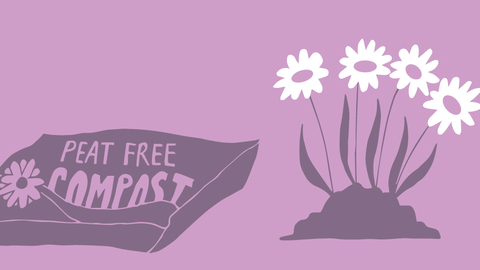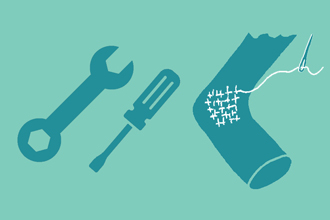
How to go peat free at home
Go peat free to protect the planet!
Peat has been a major ingredient of the compost used in gardening for many years. This peat is dug out of wild places, damaging some of the last remaining peatlands in both the UK and overseas in places like Eastern Europe. This process also releases carbon into the atmosphere, accelerating climate change. Sadly, more than 94% of the UK’s lowland peat bogs have been destroyed or damaged, and a wealth of wildlife has disappeared along with it. This vital habitat isn't easily replaced.
Download your guide to going peat-free
Top tips on going peat free
Look for retailers that are committed to phasing out peat sales
It can be difficult to tell whether the compost on sale in garden centres and supermarkets contains peat or not – details on peat content can be hidden away, and several ranges contain both peat-free and non-peat-free versions, so it can be confusing! For example, traditional recipe John Innes contains peat, whilst there are peat-free composts such as ‘SylvaGrow with John Innes’ that contain a peat-free John Innes formulation. Some brands or producers are completely peat-free, such as ALL products made by Melcourt and Dalefoot.
The Wildlife Trusts recently undertook a survey of major retailers: the table below includes some of the findings from this as well as information from retailers that have been in contact with us or made announcements since. Please note this is not an exhaustive list of retailers.
The list below shows the peat-free composts that the larger retailers stock, to help you when shopping for your garden or allotment this year. Shoppers should also look out for peat-free plants - B&Q, Dobbies, Blue Diamond group garden centres, Hillier and Asda are all stocking ranges of plants grown without using peat.
Find out if your retailer is peat-free!
| Retailer | Current offer (March 2023) |
|---|---|
|
Ashridge |
Sells only peat-free compost. Own brand bedding plants are peat-free. |
|
B&Q |
Sells only peat-free compost. |
|
Blue Diamond |
Aims to become peat-free in bagged compost by 2024. |
| British Garden Centres / Garden Stores Online | Aims to become peat-free in bagged compost by the end of 2023. |
|
Co-op |
Sells only peat-free compost. |
|
Dobbies |
Sells only peat-free compost. |
|
Iceland |
Sells only peat-free compost. |
|
Lidl |
Sells only peat-free compost. |
|
Morrisons |
Sells only peat-free compost. |
|
Notcutts |
Sells only peat-free compost. |
|
RHS |
Sells only peat-free compost. |
|
Sainsbury's |
Aims to become peat-free in bagged compost by 2024. |
| Squires | Aims to become peat-free in bagged compost by 2024. |
| Tesco |
Sells only peat-free compost. 100% peat-free across all British-grown bedding plants |
| Travis Perkins | Sells only peat-free compost. |
| Waitrose | Sells only peat-free compost. |
What is peat?
Peat is made up of decayed organic matter and vegetation, developing slowly under particular, wet conditions over thousands of years. Peat can be found in wetlands such as bogs and moors, and its composition makes it home to a unique ecosystem.
Peat bogs are home to all sorts of plants, including colourful sphagnum mosses, insect-eating plants, and curious plants such as ‘butterwort’ and ‘bog myrtle’. They also provide an environment for rare dragonflies, spiders and other invertebrates, and a feeding ground for birds, such as golden plover, meadow pipit and skylark.
When it comes to climate change, peatlands are vital. The excess carbon in our atmosphere is causing the planet to heat up. Peat bogs act like a sponge, absorbing carbon from the atmosphere and storing it like a sink.
The UK’s peatlands store around 3.2 billion tonnes of carbon and alongside the oceans, are the second largest store of carbon on the planet whilst covering a much smaller area.



